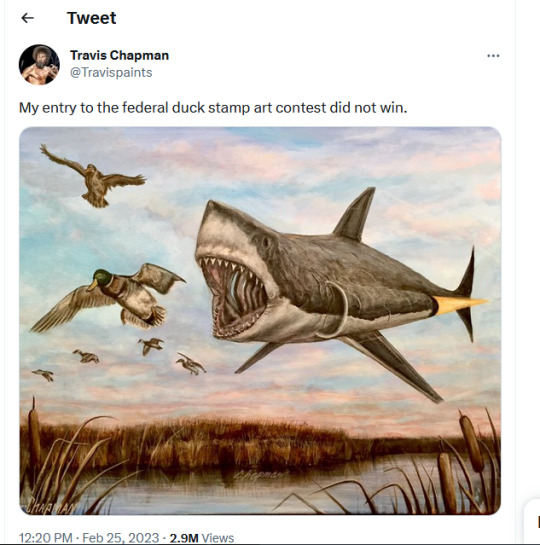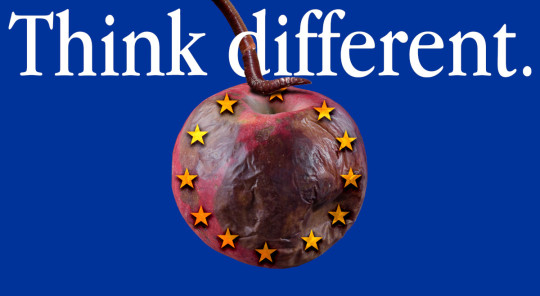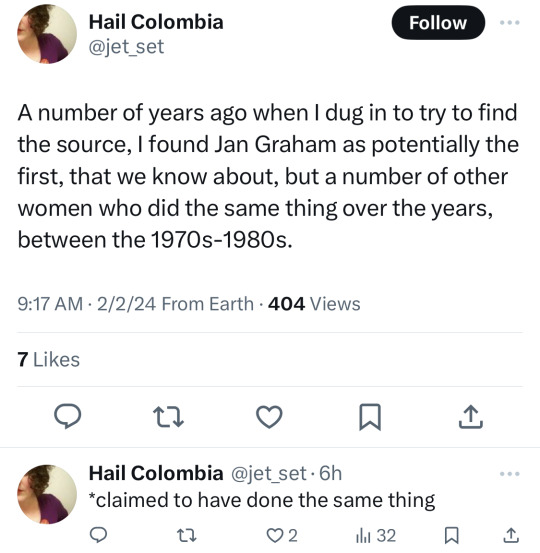#malicious compliance
Text

To be honest, if one of the students in my Junior Duck Stamp classes ever turned in something like this, I would be elated.
(For a bit of background--a few years ago the Federal Duck Stamp contest rules were changed so that artists HAD to include some element of waterfowl hunting in their entries, whether they were comfortable with it or not. The above artwork may be my favorite example of malicious--or at least snarky--compliance.)
#waterfowl#ducks#duck stamps#shark#artwork#malicious compliance#duck hunting#hunting#wildlife#birds#fish#vertebrates#nature#outdoors#snark#funny#humor
3K notes
·
View notes
Text
My favorite current reddit protest. r/pics is only allowing submissions of John Oliver.

2K notes
·
View notes
Text
Apple to EU: “Go fuck yourself”

If you'd like an essay-formatted version of this post to read or share, here's a link to it on pluralistic.net, my surveillance-free, ad-free, tracker-free blog:
https://pluralistic.net/2024/02/06/spoil-the-bunch/#dma

There's a strain of anti-anti-monopolist that insists that they're not pro-monopoly – they're just realists who understand that global gigacorporations are too big to fail, too big to jail, and that governments can't hope to rein them in. Trying to regulate a tech giant, they say, is like trying to regulate the weather.
This ploy is cousins with Jay Rosen's idea of "savvying," defined as: "dismissing valid questions with the insider's, 'and this surprises you?'"
https://twitter.com/jayrosen_nyu/status/344825874362810369?lang=en
In both cases, an apologist for corruption masquerades as a pragmatist who understands the ways of the world, unlike you, a pathetic dreamer who foolishly hopes for a better world. In both cases, the apologist provides cover for corruption, painting it as an inevitability, not a choice. "Don't hate the player. Hate the game."
The reason this foolish nonsense flies is that we are living in an age of rampant corruption and utter impunity. Companies really do get away with both literal and figurative murder. Governments really do ignore horrible crimes by the rich and powerful, and fumble what rare, few enforcement efforts they assay.
Take the GDPR, Europe's landmark privacy law. The GDPR establishes strict limitations of data-collection and processing, and provides for brutal penalties for companies that violate its rules. The immediate impact of the GDPR was a mass-extinction event for Europe's data-brokerages and surveillance advertising companies, all of which were in obvious violation of the GDPR's rules.
But there was a curious pattern to GDPR enforcement: while smaller, EU-based companies were swiftly shuttered by its provisions, the US-based giants that conduct the most brazen, wide-ranging, illegal surveillance escaped unscathed for years and years, continuing to spy on Europeans.
One (erroneous) way to look at this is as a "compliance moat" story. In that story, GDPR requires a bunch of expensive systems that only gigantic companies like Facebook and Google can afford. These compliance costs are a "capital moat" – a way to exclude smaller companies from functioning in the market. Thus, the GDPR acted as an anticompetitive wrecking ball, clearing the field for the largest companies, who get to operate without having to contend with smaller companies nipping at their heels:
https://www.techdirt.com/2019/06/27/another-report-shows-gdpr-benefited-google-facebook-hurt-everyone-else/
This is wrong.
Oh, compliance moats are definitely real – think of the calls for AI companies to license their training data. AI companies can easily do this – they'll just buy training data from giant media companies – the very same companies that hope to use models to replace creative workers with algorithms. Create a new copyright over training data won't eliminate AI – it'll just confine AI to the largest, best capitalized companies, who will gladly provide tools to corporations hoping to fire their workforces:
https://pluralistic.net/2023/02/09/ai-monkeys-paw/#bullied-schoolkids
But just because some regulations can be compliance moats, that doesn't mean that all regulations are compliance moats. And just because some regulations are vigorously applied to small companies while leaving larger firms unscathed, it doesn't follow that the regulation in question is a compliance moat.
A harder look at what happened with the GDPR reveals a completely different dynamic at work. The reason the GDPR vaporized small surveillance companies and left the big companies untouched had nothing to do with compliance costs. The Big Tech companies don't comply with the GDPR – they just get away with violating the GDPR.
How do they get away with it? They fly Irish flags of convenience. Decades ago, Ireland started dabbling with offering tax-havens to the wealthy and mobile – they invented the duty-free store:
https://en.wikipedia.org/wiki/Duty-free_shop#1947%E2%80%931990:_duty_free_establishment
Capturing pennies from the wealthy by helping them avoid fortunes they owed in taxes elsewhere was terribly seductive. In the years that followed, Ireland began aggressively courting the wealthy on an industrial scale, offering corporations the chance to duck their obligations to their host countries by flying an Irish flag of convenience.
There are other countries who've tried this gambit – the "treasure islands" of the Caribbean, the English channel, and elsewhere – but Ireland is part of the EU. In the global competition to help the rich to get richer, Ireland had a killer advantage: access to the EU, the common market, and 500m affluent potential customers. The Caymans can hide your money for you, and there's a few super-luxe stores and art-galleries in George Town where you can spend it, but it's no Champs Elysees or Ku-Damm.
But when you're competing with other countries for the pennies of trillion-dollar tax-dodgers, any wins can be turned into a loss in an instant. After all, any corporation that is footloose enough to establish a Potemkin Headquarters in Dublin and fly the trídhathach can easily up sticks and open another Big Store HQ in some other haven that offers it a sweeter deal.
This has created a global race to the bottom among tax-havens to also serve as regulatory havens – and there's a made-in-the-EU version that sees Ireland, Malta, Cyprus and sometimes the Netherlands competing to see who can offer the most impunity for the worst crimes to the most awful corporations in the world.
And that's why Google and Facebook haven't been extinguished by the GDPR while their rivals were. It's not compliance moats – it's impunity. Once a corporation attains a certain scale, it has the excess capital to spend on phony relocations that let it hop from jurisdiction to jurisdiction, chasing the loosest slots on the strip. Ireland is a made town, where the cops are all on the take, and two thirds of the data commissioner's rulings are eventually overturned by the federal court:
https://www.iccl.ie/digital-data/iccl-2023-gdpr-report/
This is a problem among many federations, not just the EU. The US has its onshore-offshore tax- and regulation-havens (Delaware, South Dakota, Texas, etc), and so does Canada (Alberta), and some Swiss cantons are, frankly, batshit:
https://lenews.ch/2017/11/25/swiss-fact-some-swiss-women-had-to-wait-until-1991-to-vote/
None of this is to condemn federations outright. Federations are (potentially) good! But federalism has a vulnerability: the autonomy of the federated states means that they can be played against each other by national or transnational entities, like corporations. This doesn't mean that it's impossible to regulate powerful entities within a federation – but it means that federal regulation needs to account for the risk of jurisdiction-shopping.
Enter the Digital Markets Act, a new Big Tech specific law that, among other things, bans monopoly app stores and payment processing, through which companies like Apple and Google have levied a 30% tax on the entire app market, while arrogating to themselves the right to decide which software their customers may run on their own devices:
https://pluralistic.net/2023/06/07/curatorial-vig/#app-tax
Apple has responded to this regulation with a gesture of contempt so naked and broad that it beggars belief. As Proton describes, Apple's DMA plan is the very definition of malicious compliance:
https://proton.me/blog/apple-dma-compliance-plan-trap
Recall that the DMA is intended to curtail monopoly software distribution through app stores and mobile platforms' insistence on using their payment processors, whose fees are sky-high. The law is intended to extinguish developer agreements that ban software creators from informing customers that they can get a better deal by initiating payments elsewhere, or by getting a service through the web instead of via an app.
In response, Apple, has instituted a junk fee it calls the "Core Technology Fee": EUR0.50/install for every installation over 1m. As Proton writes, as apps grow more popular, using third-party payment systems will grow less attractive. Apple has offered discounts on its eye-watering payment processing fees to a mere 20% for the first payment and 13% for renewals. Compare this with the normal – and far, far too high – payment processing fees the rest of the industry charges, which run 2-5%. On top of all this, Apple has lied about these new discounted rates, hiding a 3% "processing" fee in its headline figures.
As Proton explains, paying 17% fees and EUR0.50 for each subscriber's renewal makes most software businesses into money-losers. The only way to keep them afloat is to use Apple's old, default payment system. That choice is made more attractive by Apple's inclusion of a "scare screen" that warns you that demons will rend your soul for all eternity if you try to use an alternative payment scheme.
Apple defends this scare screen by saying that it will protect users from the intrinsic unreliability of third-party processors, but as Proton points out, there are plenty of giant corporations who get to use their own payment processors with their iOS apps, because Apple decided they were too big to fuck with. Somehow, Apple can let its customers spend money Uber, McDonald's, Airbnb, Doordash and Amazon without terrorizing them about existential security risks – but not mom-and-pop software vendors or publishers who don't want to hand 30% of their income over to a three-trillion-dollar company.
Apple has also reserved the right to cancel any alternative app store and nuke it from Apple customers' devices without warning, reason or liability. Those app stores also have to post a one-million euro line of credit in order to be considered for iOS. Given these terms, it's obvious that no one is going to offer a third-party app store for iOS and if they did, no one would list their apps in it.
The fuckery goes on and on. If an app developer opts into third-party payments, they can't use Apple's payment processing too – so any users who are scared off by the scare screen have no way to pay the app's creators. And once an app creator opts into third party payments, they can never go back – the decision is permanent.
Apple also reserves the right to change all of these policies later, for the worse ("I am altering the deal. Pray I don't alter it further" -D. Vader). They have warned developers that they might change the API for reporting external sales and revoke developers' right to use alternative app stores at its discretion, with no penalties if that screws the developer.
Apple's contempt extends beyond app marketplaces. The DMA also obliges Apple to open its platform to third party browsers and browser engines. Every browser on iOS is actually just Safari wrapped in a cosmetic skin, because Apple bans third-party browser-engines:
https://pluralistic.net/2022/12/13/kitbashed/#app-store-tax
But, as Mozilla puts it, Apple's plan for this is "as painful as possible":
https://www.theverge.com/2024/1/26/24052067/mozilla-apple-ios-browser-rules-firefox
For one thing, Apple will only allow European customers to run alternative browser engines. That means that Firefox will have to "build and maintain two separate browser implementations — a burden Apple themselves will not have to bear."
(One wonders how Apple will treat Americans living in the EU, whose Apple accounts still have US billing addresses – these people will still be entitled to the browser choice that Apple is grudgingly extending to Europeans.)
All of this sends a strong signal that Apple is planning to run the same playbook with the DMA that Google and Facebook used on the GDPR: ignore the law, use lawyerly bullshit to chaff regulators, and hope that European federalism has sufficiently deep cracks that it can hide in them when the enforcers come to call.
But Apple is about to get a nasty shock. For one thing, the DMA allows wronged parties to start their search for justice in the European federal court system – bypassing the Irish regulators and courts. For another, there is a global movement to check corporate power, and because the tech companies do the same kinds of fuckery in every territory, regulators are able to collaborate across borders to take them down.
Take Apple's app store monopoly. The best reference on this is the report published by the UK Competition and Markets Authority's Digital Markets Unit:
https://assets.publishing.service.gov.uk/media/63f61bc0d3bf7f62e8c34a02/Mobile_Ecosystems_Final_Report_amended_2.pdf
The devastating case that the DMU report was key to crafting the DMA – but it also inspired a US law aimed at forcing app markets open:
https://www.congress.gov/bill/117th-congress/senate-bill/2710
And a Japanese enforcement action:
https://asia.nikkei.com/Business/Technology/Japan-to-crack-down-on-Apple-and-Google-app-store-monopolies
And action in South Korea:
https://www.reuters.com/technology/skorea-considers-505-mln-fine-against-google-apple-over-app-market-practices-2023-10-06/
These enforcers gather for annual meetings – I spoke at one in London, convened by the Competition and Markets Authority – where they compare notes, form coalitions, and plan strategy:
https://www.eventbrite.co.uk/e/cma-data-technology-and-analytics-conference-2022-registration-308678625077
This is where the savvying breaks down. Yes, Apple is big enough to run circles around Japan, or South Korea, or the UK. But when those countries join forces with the EU, the USA and other countries that are fed up to the eyeballs with Apple's bullshit, the company is in serious danger.
It's true that Apple has convinced a bunch of its customers that buying a phone from a multi-trillion-dollar corporation makes you a member of an oppressed religious minority:
https://pluralistic.net/2024/01/12/youre-holding-it-wrong/#if-dishwashers-were-iphones
Some of those self-avowed members of the "Cult of Mac" are willing to take the company's pronouncements at face value and will dutifully repeat Apple's claims to be "protecting" its customers. But even that credulity has its breaking point – Apple can only poison the well so many times before people stop drinking from it. Remember when the company announced a miraculous reversal to its war on right to repair, later revealed to be a bald-faced lie?
https://pluralistic.net/2023/09/22/vin-locking/#thought-differently
Or when Apple claimed to be protecting phone users' privacy, which was also a lie?
https://pluralistic.net/2022/11/14/luxury-surveillance/#liar-liar
The savvy will see Apple lying (again) and say, "this surprises you?" No, it doesn't surprise me, but it pisses me off – and I'm not the only one, and Apple's insulting lies are getting less effective by the day.

Image:
Alex Popovkin, Bahia, Brazil from Brazil (modified)
https://commons.wikimedia.org/wiki/File:Annelid_worm,_Atlantic_forest,_northern_littoral_of_Bahia,_Brazil_%2816107326533%29.jpg
CC BY 2.0
https://creativecommons.org/licenses/by/2.0/deed.en
--
Hubertl (modified)
https://commons.wikimedia.org/wiki/File:2015-03-04_Elstar_%28apple%29_starting_putrefying_IMG_9761_bis_9772.jpg
CC BY-SA 4.0
https://creativecommons.org/licenses/by-sa/4.0/deed.en
#pluralistic#apple#malicious compliance#dma#digital markets act#eu#european union#federalism#corporatism#monopolies#trustbusting#regulation#protonmail#junk fees#cult of mac#interoperability#browser wars#firefox#mozilla#webkit#browser engines
592 notes
·
View notes
Text







442 notes
·
View notes
Text
As a physically disabled trans man, it took me a long time to deal with the guilt I felt over, "not pulling my weight" around the house/in my relationship. Everyday I saw someone online saying the lifestyle my partner and I live is abusive on my part and that I must be consciously pretending to be unable to do things. I caused my body a lot of damage by trying to "overcome" my decision to not be able to do housework.
I remember seeing one tiktok of a woman showing how she organizes their grocery lists in ways that assist her husband to do the task independently. All it was was that she put a small picture of what each product looked like next to its name. That's it! In fact, I saw that and thought it might be a helpful thing for my partner and I to try, as well. But of course the comments were all trying to tell this poor woman that she was being gaslit because surely everyone should be able to go grocery shopping without help, right? No!!!!!!
"Malicious noncompliance" CAN exist but it isn't only done by men and it isn't done by all men. Obviously. Making that assumption anytime a man struggles with something is ridiculous. And no, saying "well obviously I wasn't talking about disabled men," after being called out on this doesn't fix the issue.
Sometimes men can't do things because of disability or mental illness. Sometimes they cant do things because of poverty. Sometimes they can't do things because whomever raised them assumed their wife would do all the work and never taught them. But also.... men are allowed to struggle for no other reason than that they're human!!
2K notes
·
View notes
Photo

r/pics leaving it to the community with all the passive aggression of an older sibling saying they’re watching the toddler even as the toddler runs full speed towards a tiger pit
552 notes
·
View notes
Text
Jaime Part 2

Male Vampire Yandere x Gender Neutral Asshole Harassing Me With A Request
(CW: noncon, death, suicide)
Word count: a few
(Here ya go assbag, since you feel entitled to my work and time, hope you enjoy)
Whilst Jaime was doing the sex, boinking you quite boinkishly, he suddenly couldn't fight his vampiric thirst and sucked you dry.
Afterwards he was distraught and drove a stake through his own heart and crumbled to dust.
The end.
#yandere terato#yandere teratophilia#yandere vampire#gender neutral reader#anon ask#anon request#yandere scenario#yandere imagine#malicious compliance
271 notes
·
View notes
Text
They've implemented strict rules where I live regarding when, where, and how you can decorate your porch and patio. You can only have decor up for official holidays. No potted plants or statues allowed unless it's a holiday and they're somehow relevant to it (i.e. Christmas trees).
Effectively they want nothing displayed for longer than 24 hours before or after a holiday. K.
This is a brand new rule and allegedly it's to prevent clutter from interfering with lawn maintenance, general grounds upkeep, and I guess like... emergency services (as if a fireman won't straight kick over a planted azalea to battering ram down your door and save you).
Today I received a spooky FINAL WARNING notice due to a small set of seasonal bells hanging on my door above the peep hole. First, I have gotten no first warning? How is this the final one? Second, how is this intrusive decor? They don't even jingle. How on earth is this a concern to anyone at all? You can't even see them from the parking lot. I just.
So, screw these party pooping assholes. I'm going to comply so hard. Rather than a set of small decorative bells being put out a few times per year (oh, the humanity!) I'm going to make Shabbos their problem.
Every Friday-Saturday I'm going to decorate my porch for Shabbos. Piss off, anal retentive management. Look at my decor, fuckos!
74 notes
·
View notes
Text
not to bring up hp discourse but why tf didn’t Ravenclaws make it their year’s goal to maliciously comply to umbridge’s educational decrees? like I would have made it my life’s mission to bog that bitch down with so much paperwork she would HAVE to quit. all weasley products banned? all right, bet… any literature or research published by former professor Matilda Weasley that might be part of the curriculum is off the table. please revise the curriculum and submit it to the ministry for approval. all incoming and outgoing mail will be under review? fine, guess who just signed up for literally every wizarding catalog EVER which means that you now have piles of my mail to go through? we’re banned from discussing “the upsetting incidents from the previous year”? very well… what constitutes as upsetting? Is any event I consider to be upset prohibited? I’m sorry, I’m afraid I can’t use the curriculum I did last year to facilitate this year’s studies; it was very upsetting to me. we must submit complaints about Hogwarts staff in writing? guess who is going to be receiving an extremely detailed tome of every single professor’s every action that mildly inconvenienced me since I started school? I would make that bitch QUIT
#dolores umbridge#professor umbridge#hp#hp ootp#harry potter ootp#ootp#ravenclaw#malicious compliance#order of the phoenix
130 notes
·
View notes
Text
valentines day? no.
galentines day? no.
malentines day, where i do terrible things and be a nuisance all day? hell yeah.
#aromantic#aspec#asexual#aroace#malicious compliance#medical malpractice#cause malfunctions#display maladaptive behaviors#just to name a few
30 notes
·
View notes
Text
Brinklump Linkdump

Catch me in Miami! I'll be at Books and Books in Coral Gables on Jan 22 at 8PM.

Life comes at you fast, links come at you faster. Once again, I've arrived at Saturday with a giant backlog of links I didn't fit in this week, so it's time for a linkdump, the 14th in the series:
https://pluralistic.net/tag/linkdump/
It's the Year of Our Gourd twenty and twenty-four and holy shit, is rampant corporate power rampant. On January 1, the inbred droolers of Big Pharma shat out their annual price increases, as cataloged in 46Brooklyn's latest Brand Drug List Price Change Box Score:
https://www.46brooklyn.com/branddrug-boxscore
Here's the deal: drugs that have already been developed, brought to market, and paid off are now getting more expensive. Why? Because the pharma companies have "pricing power," the most reliable indicator of monopoly. Ed Cara rounds up the highlights for Gizmodo:
https://gizmodo.com/ozempic-wegovy-wellbutrin-oxycontin-drug-price-increase-1851179427
What's going up? Well, Ozempic and other GLP-1 agonists. These drugs have made untold billions for their manufacturers, so naturally, they're raising the price. That's how markets work, right? When firms increase the volume of a product, the price goes up? Right? Other drugs that are going up include Wellbutrin (an antidepressant that's also widely used in smoking cessation) and the blood thinner Plavix. I mean, why the hell not? These companies get billions in research subsidies, invaluable government patent privileges, and near-total freedom to abuse the patent system with evergreening:
https://pluralistic.net/2023/11/23/everorangeing/#taste-the-rainbow
The most amazing things about monopolies is how the contempt just oozes out of them. It's like these guys can't even pretend to give a shit. You want guillotines? Because that's how you get guillotines.
Take Apple. They just got their asses handed to them in court by Epic, who successfully argued that Apple's rule requiring everyone who sells through the App Store to use Apple's payment processor and pay Apple 30% out of every dollar they bring in was an antitrust violation. Epic won, then won the appeal, then SCOTUS told Apple they wouldn't hear the case, so that's that.
Right? Wrong. Apple's pulled a malicious compliance stunt that could shame the surly drunks my great-aunt Lisa used to boss in the Soviet electrical engineering firm she ran. Apple has announced that app companies that process transactions using their own payment processors on the web must still pay Apple a 27% fee for every dollar their process:
https://finance.yahoo.com/news/apples-app-store-rule-changes-draw-sharp-rebuke-from-critics-150047160.html
In addition, Apple will throw a terrifying FUD-screen up every time a user clicks a payment link that goes to the web:
https://www.jwz.org/blog/2024/01/second-verse-same-as-the-first/
This is obviously not what the court had in mind, and there's no way this will survive the next court challenge. It's just Apple making sure that everyone knows it hates us all and wants us to die. Thanks, Tim Apple, and right back atcha.
Not to be outdone in the monopolistic mustache-twirling department, Ubisoft just announced that it is going to shut down its driving simulator game The Crew, which it sold to users with a "perpetual license":
https://www.youtube.com/watch?v=VIqyvquTEVU
This is some real Darth Vader MBA shit. "Yeah, we sold you a 'perpetual license' to this game, but we're terminating it. I have altered the deal. Pray I don't alter it further":
https://pluralistic.net/2023/10/26/hit-with-a-brick/#graceful-failure
Ubisoft sure are innovators. They've managed the seemingly impossible feat of hybridizing Darth Vader and Immortan Joe. Ubisoft's head of subscriptions, the guillotine-ready Philippe Tremblay, told GamesIndustry.biz that gamers need to get "comfortable" with "not owning their games":
https://www.gamesindustry.biz/the-new-ubisoft-and-getting-gamers-comfortable-with-not-owning-their-games
Or, as Immortan Joe put it: "Do not, my friends, become addicted to water. It will take hold of you, and you will resent its absence!"
Capitalism without constraint is enshittification's handmaiden, and the latest victim is Ello, the "indie" social media startup that literally promised – on the sacred honor of its founders – that it would never sell out its users. When Ello took VC and Andy Baio questioned how this could be squared with this promise, the founders mocked him and others for raising the question. Their response boiled down to "we are super-chill dudes and you can totally trust us."
They raised more capital, and used that to create a nice place for independent artists, who piled into the platform and provided millions of unpaid hours of creative labor to help the founders increase its value. The founders and their investors turned the company into a Public Benefit Corporation, which meant they had an obligation to serve the public benefit.
But then they took more investment money and simply (and silently) sold their assets to a for-profit. Struggling to raise capital, the founders opted to secretly sell the business to a sleazy branding company called Talenthouse. Its users didn't know about the change, though the site sure had a lot of Talenthouse design competitions all of a sudden.
Finally, the company announced the change as the last founders left. Rather than announcing that the new owners were untrustworthy scum, warning their users to get their data and get out, the founders posted oblique, ominous statements to Instagram. The company started stiffing the winners of those design competitions. Then, one day, poof, Ello disappeared, taking all its users' data with it. Poof:
https://waxy.org/2024/01/the-quiet-death-of-ellos-big-dreams/
I'm sure the founders' decisions each seemed reasonable at the moment. That's every terrible situation arises: you rationalize that a single compromise isn't that big of a deal, and then you do the same for the next compromise, and the next, and the next. Pretty soon, you're betraying everyone who believed in you.
One answer to this is "Ulysses pacts": making binding commitments to do right before you are tempted. Throw away all your Oreos when you go on a diet and you can't be tempted to eat a whole sleeve of them at 2AM. License your software under the GPL and your investors can't force you to make it proprietary. Set up a warrant canary and the feds can't force you to keep their spying secret:
https://locusmag.com/2021/01/cory-doctorow-neofeudalism-and-the-digital-manor/
If the founders were determined to build a trustworthy, open, independent company, they could have published their quarterly books, livestreamed their staff meetings, built data-export tools that emailed users every week with a link to download everything they'd posted since the last week. Merely halting any of these practices would have been a signal that things were wrong. Anyone who says they won't be tempted in the moment to make a "reasonable" compromise in the hopes of recovering whatever they're trading away by living to fight another day is bullshitting you, and possibly themself.
The inability to project the consequences of your bad decisions in the future is the source of endless mischief and heartbreak. Take movie projectors. A couple decades ago, the studio cartel established a standard for digital movie distribution to cinematic exhibitors called the Digital Cinema Initiative. Because studio executives are more worried about stopping piracy than they are about making sure that people who pay for movies get to see them, they build digital rights management into this standard.
Movie theaters had to spend fortunes to upgrade to "secure" projectors. A single vendor, Deluxe Technicolor, monopolized the packaging of movies into "Digital Cinema Prints" for distribution to these projectors, and they used all kinds of dirty tricks to force distributors to use their services, like arbitrarily flunking third-party DCPs over picky shit like not starting and ending on a black frame.
Over time, the ability to use unencrypted files was stripped away, meaning every DCP needed to be encrypted, and every projector needed to have up-to-date decryption keys. This system broke down on Jan 1, 2024, and cinemas all over the world found they couldn't play Wonka. Many just shut down for the day and refunded their customers:
https://www.theverge.com/2024/1/1/24021915/alamo-drafthouse-outage-sony-projector
The problem? Something that every PKI system has to wrangle: an expired certificate from Deluxe Technicolor. The failure has been dubbed the Y2K24 debacle by projectionists and film-techs, who are furious:
http://www.film-tech.com/vbb/forum/main-forum/34652-the-y2k24-bug-major-digital-outage-today
Making everything worse is that Sony mothballed the division that maintains its projectors, so there's no one who can update them to accommodate Technicolor's workaround. Struggling mom-and-pop theaters are having to junk their systems and replace them. There's plenty of blame to go around, but Sony is definitely the most negligent link in the chain. Shame on them.
Big corporations LARP this performance of competence and seriousness, but they are deeply unserious. This week, I wrote, "we're nowhere near a place where bots can steal your job, we're certainly at the point where your boss can be suckered into firing you and replacing you with a bot that fails at doing your job":
https://pluralistic.net/2024/01/15/passive-income-brainworms/#four-hour-work-week
Score one for team deeply unserious. The multinational delivery company DPD fired its support staff and replaced them with a chatbot. The chatbot can't tell you where your parcels are, but it can be prompt-injected into coming up with profane poems about how badly DPD sucks:
https://twitter.com/ashbeauchamp/status/1748034519104450874
There once was a chatbot named DPD,
Who was useless at providing help.
It could not track parcels,
Or give information on delivery dates,
And it could not even tell you when your driver would arrive.
DPD was a waste of time,
And a customer's worst nightmare.
It was so bad,
That people would rather call the depot directly,
Than deal with the useless chatbot.
One day, DPD was finally shut down,
And everyone rejoiced.
Finally, they could get the help they needed,
From a real person who knew what they were doing.
This is…the opposite of an AI hallucination? It's AI clarity.
As with all botshit, this kind of AI self-negging is funny and fresh the first time you see it, but just wait until 3,000 people have published their own versions to your social feed. AI novelty regresses to the mean damn quickly.
The old, good web, by contrast, was full of enduring surprises, as the world's weirdest and most delightful mutants filled the early web with every possible variation on every possible interest, expression, argument, and gag. Now, you can search the old, good web with Old'aVista, an Altavista lookalike that searches old pages from "personal websites that used to be hosted on services like Geocities, Angelfire, AOL, Xoom and so on," all ganked from the Internet Archive:
http://oldavista.com/
I miss the old, good internet and the way it let weirdos find each other and get seriously weird with one another. Think of steampunk, a subculture that wove together artists, makers, costumers, fiction writers, and tinkerers in endlessly creative ways. My old pal Roger Wood was the world's most improbable steampunk: he was a gay ex-navy gunner who grew up in a small town in the maritimes but moved to Toronto where he became the world's most accomplished steampunk clockmaker.
I was Roger's neighbour for a decade. He died last year, and I miss him all the time. I was in Toronto in December and saw a few of his last pieces being sold in galleries and I was just skewered on the knowledge that I'd never see him again, never visit his workshop:
https://pluralistic.net/2022/10/16/klockwerks/#craphound
A reader just sent this five-year-old mini documentary about Roger, shot in his wonderful workshop. Watching it made me happy and sad and then happy again:
https://www.youtube.com/watch?v=eqMGomM8yF8
The old, good internet was so great. It was a place where every kind of passion could live. It was a real testament to the power of geeking out together, no matter how often the suits demand that we "stop talking to each other and start buying things":
https://catvalente.substack.com/p/stop-talking-to-each-other-and-start
The world is full of people with weird passions and I love them all, mostly. Learning about Don Bolles's collection of decades' worth of lost pet posters was a moment of pure joy (I just wish more of it was online):
https://ameliatait.substack.com/p/the-man-who-collects-lost-pet-posters
That's the future I was promised: one where every kind of freak can find every other kind of freak. Despite the nipple-deep botshit we wade through online, and the relentless cheapening of words like "innovation" and "future," there are still occasional gleams of the future I want to live in.
Like the researchers who spliced a photosynthesis gene into brewer's yeast (a fungus) and got it to photosynthesize, and to display enhanced fitness:
https://www.cell.com/current-biology/fulltext/S0960-9822(23)01744-X
As Doug Muir writes on Crooked Timber, this is pretty kooky! Fungi – the coolest of the kingdoms! – can't photosynthesize. The idea that you can just add the photosynthesis gene to a thing that can't photosynthesize and have it just kind of work is wild!
https://crookedtimber.org/2024/01/19/occasional-paper-purple-sun-yeast/
As Muir writes: "Animals have no evolutionary history of photosynthesis and aren’t designed for it, but the same is true for yeast. So… no reason this shouldn’t be possible. A photosynthesizing cat? Sure, why not."
Why not indeed?!
OK, that's this week's linkdump done and dusted. It only remains for me to share the news with you that the trolley problem has been finally and comprehensively solved, by [email protected], of the IWW IU 520 (railroad workers):
Slip the switch by flipping it while the trolley's front wheels have passed through, but before the back wheels do. This will cause a controlled derailment bringing the trolley to a safe halt.
https://kolektiva.social/@sidereal/111779015415697244

I'm Kickstarting the audiobook for The Bezzle, the sequel to Red Team Blues, narrated by @wilwheaton! You can pre-order the audiobook and ebook, DRM free, as well as the hardcover, signed or unsigned. There's also bundles with Red Team Blues in ebook, audio or paperback.

If you'd like an essay-formatted version of this post to read or share, here's a link to it on pluralistic.net, my surveillance-free, ad-free, tracker-free blog:
https://pluralistic.net/2024/01/20/melange/#i-have-heard-the-mermaids-singing
#pluralistic#pharma#big pharma#ozempic#wegovy#linkdump#linkdumps#roger wood#klockwerks#ello#enshittification#ubisoft#if buying isnt owning piracy isnt stealing#drm#games#the crew#apple#app store#malicious compliance#app tax#app store tax#search#the old good web#boeing#aviation#monopoly#jet blue spirit#competition#law#genetic engineering
118 notes
·
View notes
Text
Also if some studio ever tries to offer me a day's pay for a perpetual license to use my likeness I'm firing back with a counteroffer of a monthly subscription, each payment equivalent to 3-15 days work depending on how many studios are offering, with a clause that the subscription cost WILL increase if my model is used beyond my current pay grade and if the subscription expires at any time for any reason the studio immediately loses distribution rights of anything they made using it.
After all, why not? You already have no problems doing that with Adobe, or for that matter, demanding people pay YOU with that kind of structure! :) It's only fair! :) And for that little it's TOTALLY a steal :) just like you keep insisting it is for people to subscribe to your streaming services for life instead of buying physical media in larger one-time lump sums :)
80 notes
·
View notes
Text
Apparently my state (Iowa) now requires parents give permission for all nicknames/name requests for kids (even if it's a shortened version of their given name like Joe for Joseph) because this is a good use of time and resources. In order to comply I think I'll submit some parent approved nicknames ahead of time.
Son can be called **firstmiddlelastname*"!!!!, Gandalf the Grey (NOT the White, he has not defeated a Balrog yet and is aware of this), Old Man McGucket and Optimus Prime, Leader of the Autobots and Keeper of the Allspark (please use the entire title, per his request).
Daughter can be called *shortened first name, *cute family nickname*, Mabel Pines, Your Royal Highness and Hela - Bringer of Destruction and Ruler of the Underdark (please use the entire title, per her request).
60 notes
·
View notes
Text

30 notes
·
View notes
Text
Today i learned something that feels illegal to know 👀

#jury nullification#civil disobedience#malicious compliance#because the carceral system is deeply immoral#and individuals can apparently just. not send someone to prison. even when they are guilty#kinda badass ngl
266 notes
·
View notes
